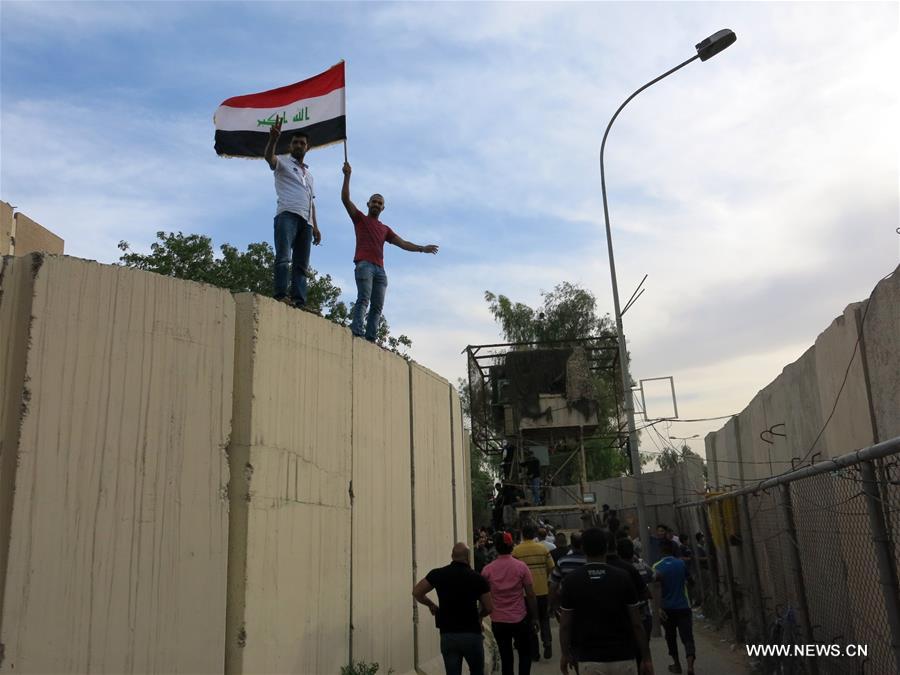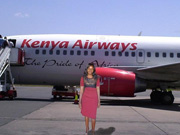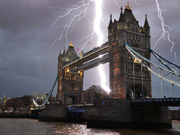

 |
| Followers of Shiite cleric Moqtada al-Sadr are seen in central Baghdad, Iraq on April 30, 2016. Thousands of followers of Shiite cleric Moqtada al-Sadr on Saturday stormed the heavily fortified Green Zone in central Baghdad and took control of the parliament building and surrounding areas, while dozens of lawmakers, officials and employees tried to escape the government district. (Xinhua/Khalil Dawood) |
Iraq's top leaders on Saturday called on the protestors who broke into the parliament in central Baghdad to leave the building and preserve the public properties.
"We assure our people that the situation in Baghdad is under the control of the security forces, and I call on the demonstrators to withdraw and protest peacefully, and not to encroach upon the public and private properties, which are the property of all Iraqis," Prime Minister Haider al-Abadi said in a statement.
Meanwhile, President Fuad Masoum urged the protestors to be calm, law-abiding and self-restraint.
He also called on the protestors "not to harm the lawmakers and employees, not to touch the public and private properties, and to evacuate the (parliament) building."
"We also call on the prime minister, speaker and leaders of parliament blocs to come up with the desired reshuffle and implement the reforms to fight the corruption," Masoum said.
"We consider ending the quota system of the political parties and Iraqi factions is an undelayable mission at all," said Masoum, referring to the political system created following the U.S.-led invasion in 2003, according to which Iraq's resources and control would be divided among the political parties representing Iraq's ethnic and sectarian factions.
Abadi was supposed to appear before parliament earlier Saturday to present the remainder of his Cabinet reshuffle, but the session was postponed until next week for lack of quorum.
In the afternoon, thousands of followers of Shiite cleric Moqtada al-Sadr broke into the heavily fortified Green Zone and took control of the parliament building and surrounding areas, while dozens of lawmakers, officials and employees tried to escape the government district.
The demonstrators broke into the main gate of the government district, many jumping over the barbed wired fences into the zone that houses major government offices, including the parliament and some foreign embassies.
The protesters were well-controlled by their leaders who shouted with loudspeakers that their move inside the Green Zone must be peaceful and the security forces are their brothers not enemies.
Footage aired by local media showed dozens of four-wheel drive vehicles, said to be carrying lawmakers and government officials who were trying to escape the zone, were crowded in long lines at other entrance of the zone near the Tigris River.
Storming the Green Zone came minutes after Sadr delivered a televised speech from the holy Shiite city of Najaf, in which he rejected the latest approval of partial cabinet members presented earlier by Abadi.
"Any minister in the Iraqi government is not our candidate and represents only his government," Sadr said, confirming that he and his followers "will not participate in any political process that includes quota system."
He said that all the political blocs decided to vote on their loyal ministers under the title of political technocrats.
"All those political blocs decided to kill the real reform movement through today's parliament session," Sadr said, referring to the parliament session which failed earlier in the day to achieve quorum due to deep division by the political blocs over the new candidates presented by Abadi for his new cabinet.
Some political blocs and politicians apparently have been resisting the reforms because there is a lack of trust among the political parties who see that such reforms, or part of them, are marginalizing their factions from the political scene which originally was built on power-sharing agreements.
Sadr's discontent with the partial cabinet reshuffle, which was part of Abadi's reforms, was seen as a signal for his followers to increase pressure on the parliament by storming the Green Zone.
A series of failed reform measures have paralyzed Iraq's parliament and the government as the country struggles to fight the Islamic State (IS) militant group, which seizes swathes of territories in northern and western Iraq. The country is also in dire need to respond to an economic crisis sparked in part by a plunge in global oil prices.
Day|Week

 Female official wearing traditional Han costume to promote local tourism
Female official wearing traditional Han costume to promote local tourism Over 12,000 Runners Seek Medical Care in S China’s Marathon
Over 12,000 Runners Seek Medical Care in S China’s Marathon Six Luxury Sports Cars Totaled after Fail Attempts to Cross China’s Most Perilous Highway Linking SW China’s Sichuan and Tibet
Six Luxury Sports Cars Totaled after Fail Attempts to Cross China’s Most Perilous Highway Linking SW China’s Sichuan and Tibet Incredible Transformation: “Witch Child”Whose Parents Left Him for Dead in Nigerian Makes Speedy Recovery
Incredible Transformation: “Witch Child”Whose Parents Left Him for Dead in Nigerian Makes Speedy Recovery Kenyan woman's crappy photoshopped pictures make her a web celebrity
Kenyan woman's crappy photoshopped pictures make her a web celebrity Magnificent view of E. China's Anhui province
Magnificent view of E. China's Anhui province Global landmarks captured in striking shots
Global landmarks captured in striking shots Thailand Elephants Disguised as Pandas Sparks Debates
Thailand Elephants Disguised as Pandas Sparks Debates College girl dresses as mermaid to mark World Water Day
College girl dresses as mermaid to mark World Water Day J-15 fighters in drill on Chinese aircraft carrier
J-15 fighters in drill on Chinese aircraft carrier